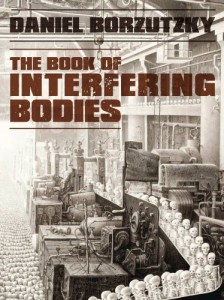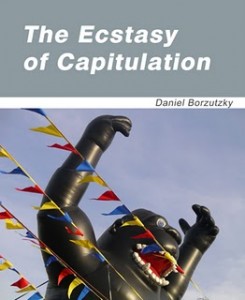Poetry Review: Daniel Borzutzky — Killing From Too Great A Distance
There is no question that somewhere in this collection poet Daniel Borzutzky draws a parallel between bureaucrats and terrorists, between politicians and increasingly dehumanized societies—both in America and abroad—but the connections are like underground cables: I can only guess at where I might dig to uncover them.
The Book of Interfering Bodies by Daniel Borzutzky, Nightboat Books, $15.95.
By Vincent Czyz
When a novelist’s main character is a writer and the act of writing performs a significant role in the novel, the publishing industry sometimes refers to the novel as writer’s porn. This type of self-reflexiveness has to be fairly extraordinary for the novel to work because a preoccupation with language and the abstract is often of greater interest to the author than to the reader. Narrative movement lags. In other words, it’s a hard sell. Philip Roth’s Zuckerman novels might be the most famous examples. John Updike’s trilogy featuring Henry Bech, the first of which was published about seven years before Roth released his first, may actually have inspired the Zuckerman series.
I admit that it may only be my own prejudice at work here, but when writer’s porn is attempted in poetry, the work more often than not seems inbred. Constantly directing the reader’s attention to poetry, poets, and words is a way of reminding us—insisting to us—that poetry/language suffers from an essential impotence, that it can’t go beyond the page or in any way transcend itself. It does not seem to me an effective way to deal with the world outside of the poems.
A survey of titles from Daniel Borzuztky’s The Book of Interfering Bodies makes it fairly clear that poetry gazing obsessively in a mirror is at least one element of the work as a whole. To begin with, nearly every other poem is titled “The Book of …”; there are 17 altogether. Here is a sample from “The Book of Flesh”: “In this book there are pieces of flesh; skin and ash and rain and the book is one of many piled in a tower of books in the center of an endless circle of ash.” Keep an eye on the images here; we are going to see them again and again. Here are a few other titles I found disheartening for the reasons cited above: “State Poetry,” “The Readers,” “Budge Cuts Prevent me from Writing Poetry,” “In other Words,” “Poetry is Dangerous in America,” “The Relevance of Poetry in our Current Climate,” and “Neighborhood Poem.”
Titles aside, the work itself dwells obsessively on corpses, bones, blood, ashes, and dismemberment. In “Resuscitation” we read
I chopped the horse legs into thousands of pieces and they said what do
you see
I said I see thousands of bone shards and blood and bits of hair and in
each fragment there are villages, towns hamlets, inlets, streets suburbs
In the “Book of Broken Bodies,” “the bodies meld together in a tangle of flesh and blood and mucus. [. . .] Here the bodies who drank themselves silly and sliced off their fingers whisper with the prison guards who hold sacs [sic] of hands and toes that were taken from the men before they were forced to bark like dogs as they hobbled alone in the night.” In “The Book of Echoes,” “A man opens his mouth and a little bomb drops out if it and when it detonates books and rivers form out of the ashes.” In “Poetry is Dangerous in America,” “the dangling corpse of the poet laureate hung from the vines of the cool and shady courtyard.” In “Bureaucratic Love Prevention Game,” we come across the usual blood and bones as well as “I love you more and more as your body shrivels to ash, says one body to another.” In “The Book of Equality,” “The reader opens a dead book and finds an infinite amount of burnt ash between the bindings, and when the ash blows in the wind the lipstick says that every death in the world is equal to every other death in the world which is equal to every birth in the world which is equal to every act of dismemberment . . .”
Words are like gum in the sense that if you chew too long, they really do lose their flavor.
Repetition aside, I don’t find the language particularly evocative. There are times, in fact, when I don’t even have much of an idea of what Borzutzky would like to convey. “Failure in the Imagination” is a poem that embodies fairly well most of my criticisms. The hero is a “miniscule hermaphrodite with no buttocks and two groins.” He is of course also a poet.
The miniscule hermaphrodite poet on my window is a terrorist whose deepest
desire is to turn Manhattan into a giant bowl of milk.
[ . . .]
He writes poetry by slicing off the body parts of the citizens of New York
City and dumping them in the bowl of milk.
The disembodied hand of a banker and the disembodied hand of a poet fuse
into a pantoum on the far edge of the giant bowls of milk that New York City
has now become.
From now on all culture will be body parts floating in milk, shouts the miniscule hermaphrodite poet terrorist through his bullhorn.
I’m just not sure what to make either of these lines or of the poem as a whole, which goes on about the hermaphroditic homunculus and his gruesome escapades with a city-sized bowl of milk for five and a half pages. There is no question that somewhere in this collection Borztuzky draws a parallel between bureaucrats and terrorists, between politicians and increasingly dehumanized societies—both in America and abroad—but the connections are like underground cables: I can only guess at where I might dig to uncover them.
My review of Borzutzky’s previous book, The Ecstasy of Capitulation, found his writing to be innovative and witty, humorous and quirky. This time, however, he is, like a bomber pilot, killing from a distance. The poems are too abstract and general; there is almost nothing specific and personal. And it’s much less effective when we see the explosions from afar but miss the actual lives that have been destroyed.
Tagged: contemporary, Daniel Borzutzky, Nightboat Books, Poetry, The Book of Interfering Bodies




What a cover!
It is a fabulous cover.